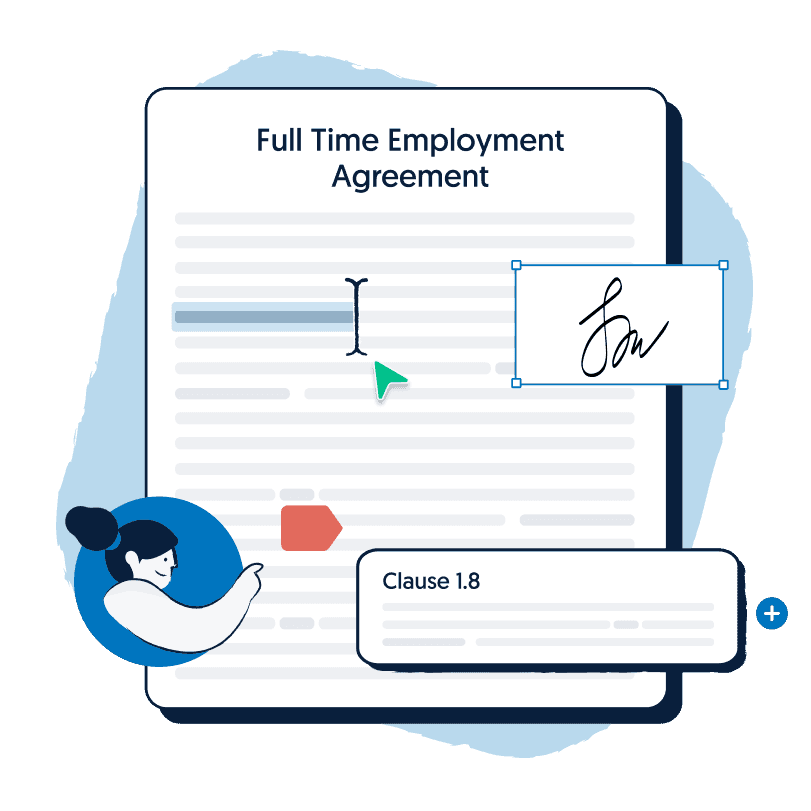There are many risks associated with working alone or unsupervised. ‘Lone working’ can put employees in situations where they are unable to seek immediate medical or emergency services because of the time, location and specific work that they do. This area of employment law is crucial and often overlooked. Keep reading to find out whether it’s legal for a person to work alone.

Get your Full Time Employment Agreement legal document for free.
Defining ‘Lone’ or ‘Isolated’ Working
According to Model Work Health and Safety (WHS) Regulations, lone working refers to ‘work that is isolated from the assistance of other persons because of location, time or the nature of the work’. Lone workers face additional risks relating to WHS simply because no one is physically around to assist with difficult tasks. They don’t have another person to provide a second opinion on potential hazards relating to a task or to spot tiredness and fatigue if the worker is making mistakes as a result. Safe Work Australia has also found that alone or remote work can increase risks in any profession. This includes greater exposure to violence and decreased access to emergency assistance or care.
When is it Legal for a Person to Work Alone?
So, when is it OK to work alone or remotely under law you may be asking? While there’s no actual law that prohibits working alone or remotely, there are general principles under the Work Health and Safety Act 2011 (Cth) that employers must abide by to ensure the safety of lone workers. Working alone is legal when other people are close by.
For example, cleaners can legally work alone at night in an office building located in the city or in a shopping centre where there’s customer traffic. Other examples include working far away from popular areas, such as a farm. Even one hundred workers in a base camp can be considered lone working. This is due to the remote location, which is a factor that also determines lone working.
Who Can Work Alone?
- All-night service station attendants
- Convenience store attendants;
- Security guards;
- Field workers: farmers, agricultural workers, park rangers and scientists;
- Cleaners in office buildings or shopping centres;
- Sales representatives: retail sales assistants and real estate agents;
- Freight transport drivers;
- Health workers such as nurses providing clinical care to patients;
- Community workers who work with the public but are away from colleagues; and
- People working from home.
How to Manage Risks
Earlier we identified the key WHS risks that arise from lone working. Here’s what you must consider when it comes to conducting a risk assessment:
- Duration of time that an employee is, or may potentially work alone;
- Time a person is working alone, whether it’s daytime or nighttime;
- Location of where the work is being carried out: is it safe?
- The workplace’s design and layout;
- Availability of first aid in the workplace;
- Are there adequate communication or security channels?
- Nature of work, the employee’s skills and capabilities relating to their competency of carrying out the work and medical conditions or considerations; and
- Job training, information and instruction.
Your Responsibilities as an Employer
As an employer or PCBU (person conducting a business or undertaking), you must ensure that you follow the specific laws and regulations that apply to isolated or remote work. This includes:
- Managing the risks to the health and safety of a remote or isolated worker and implementing a system of effective communication; and
- Minimising the risks to your workers health and safety.
Some things that you can implement in managing and minimising risks to your employees can include checking in with your workers on a regular basis. This can be done over the phone or a periodic visit to the premises of work. You may also want to look into implementing an emergency response plan in the event that your worker’s safety and health (both mental and physical) are affected.
Key Take Aways
So, to answer the question: can a person legally work alone? The answer is YES. If you’d like to know more about alone or remote working, Lawpath can direct you to the right employment lawyer for you. To summarise, here’s what you need to keep in mind about working alone:
- There are specific laws, regulations and risks involved;
- Working alone increases a person’s exposure to violence and has great implications for physical health and wellbeing;
- It’s perfectly acceptable for a wide range of professionals to work alone;
- A risk assessment must be carried out and consider WHS related issues;
- Employers have a responsibility to manage and minimise risks by implementing emergency response plans in accordance with legislation.




